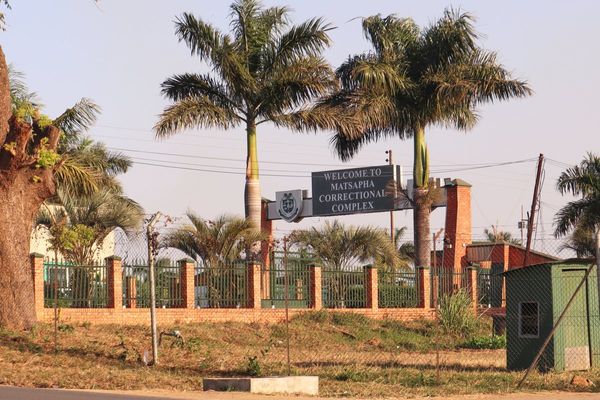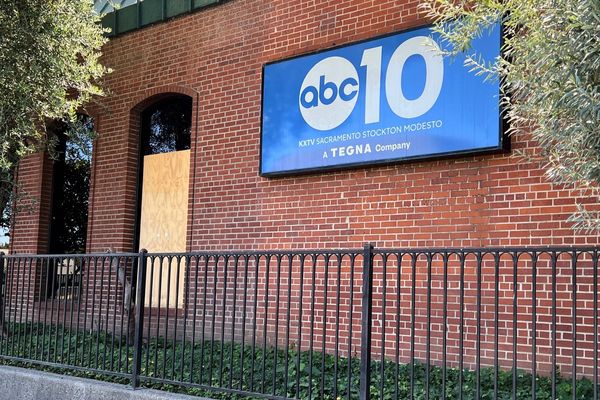President Donald Trump has announced he is to target films made outside the US with a 100% tariff in a major blow to the British film industry.
In a Sunday night post on his Truth Social platform, Mr Trump said he has authorised the Department of Commerce and the Office of the US Trade Representative to impose a 100% tariff "on any and all Movies coming into our Country that are produced in Foreign Lands".
"The Movie Industry in America is DYING a very fast death," he wrote, complaining that other countries "are offering all sorts of incentives to draw" filmmakers and studios away from the US.
"This is a concerted effort by other Nations and, therefore, a National Security threat. It is, in addition to everything else, messaging and propaganda!"
It was not immediately clear how any such tariff on international productions could be implemented. It is common for both large and smaller films to include production in both the US and other countries.
Several recent major movies produced by US studios were shot outside America, including Deadpool & Wolverine, Wicked and Gladiator II.
The global hit "Wicked" was primarily filmed in the UK, with a significant portion of the production taking place at Sky Studios Elstree in Hertfordshire.
While part of the big budget upcoming Mission: Impossible - The Final Reckoning, for instance, was shot in Britain.
The UK film sector is worth £1.36 billion and employs more than 195,000 people, the Government said last year, as it announced independent film productions costing up to £15 million would benefit from an increased tax relief of 53%.
The UK's Department for Culture, Media & Sport, industry body the British Film Institute and the Motion Picture Association, which represents the five major US film studios, did not immediately comment on Trump’s announcement.

But Philippa Childs, head of the Broadcasting, Entertainment, Communications and Theatre Union (Bectu), said the move "could deal a knock-out blow" to the UK industry which is "only just recovering" from the impact of the Covid-19 pandemic, when many productions were delayed or cancelled.
"The UK is a world leader in film and TV production, employing thousands of talented workers, and this is a key growth sector in the Government's industrial strategy," she said.
"These tariffs, coming after Covid and the recent slowdown, could deal a knock-out blow to an industry that is only just recovering and will be really worrying news for tens of thousands of skilled freelancers who make films in the UK.
"The Government must move swiftly to defend this vital sector, and support the freelancers who power it, as a matter of essential national economic interest."
Adrian Wootton, chief executive of the Brtitish Film Commission, said: "While this announcement is clearly concerning, we need to understand the detail surrounding the proposed tariffs. We will be meeting with Government and our industry policy group in the coming days to discuss further.
"The UK and US have long enjoyed a strong, shared history of film-making, recently celebrating 100 years of creative collaboration and production. We look forward to continuing that for years to come, to our mutual benefit."
The BFC is the Government's national organisation responsible for inward investment in film and TV production in the UK.
Culture, Media and Sport (CMS) Committee chairwoman Dame Caroline Dinenage said members warned "against complacency on our status as the Hollywood of Europe" in their report on British film and high-end TV, published last month.
"President Trump's announcement has made that warning all too real," she added.
"Making it more difficult to make films in the UK is not in the interests of American businesses. Their investment in facilities and talent in the UK, based on US-owned IP (intellectual property), is showing fantastic returns on both sides of the Atlantic. Ministers must urgently prioritise this as part of the trade negotiations currently under way.
"At the same time, the Government's forthcoming Creative Industries Sector Plan needs to meet the challenge we set down of incentivising inward investment while also growing our domestic sector so British film and high-end TV can thrive."

Incentive programmes for years have influenced where movies are shot, increasingly driving film production out of California and to other states and countries with favourable tax incentives, like Canada and the UK.
Yet tariffs are designed to lead consumers toward American products, and American-produced movies overwhelmingly dominate the domestic marketplace.
China has ramped up its domestic movie production, culminating in the animated blockbuster Ne Zha 2 grossing more than two billion dollars (£1.5 billion) this year. But even then, its sales came almost entirely from mainland China.
In North America, it earned just 20.9 million dollars (£15.7 million).
The Motion Picture Association did not immediately respond to messages on Sunday evening.
According to the MPA, the American movies produced 22.6 billion dollars (£17 billion) in exports and 15.3 billion dollars (£11.5 billion) in trade surplus in 2023.
Mr Trump has made good on the "tariff man" label he gave himself years ago, slapping new taxes on goods made in countries around the globe. That includes a 145% tariff on Chinese goods and a 10% baseline tariff on goods from other countries, with even higher levies threatened.
By unilaterally imposing tariffs, he has exerted extraordinary influence over the flow of commerce, creating political risks and pulling the market in different directions.
There are tariffs on autos, steel and aluminium, with more imports, including pharmaceutical drugs, set to be subject to new tariffs in the weeks ahead.
Mr Trump has long voiced concern about movie production moving overseas.
Shortly before he took office, he announced that he had tapped actors Mel Gibson, Jon Voight and Sylvester Stallone to serve as "special ambassadors" to Hollywood to bring it "BACK-BIGGER, BETTER, AND STRONGER THAN EVER BEFORE!"
US film and television production has been hampered in recent years, with setbacks from the Covid-19 pandemic, the Hollywood guild strikes of 2023 and the recent wildfires in the Los Angeles area.
Overall production in the US was down 26% last year compared with 2021, according to data from ProdPro, which tracks production.
The group's annual survey of executives, which asked about preferred filming locations, found no location in the US made the top five, according to the Hollywood Reporter. Toronto, the UK, Vancouver, Central Europe and Australia came out on top, with California placing sixth, Georgia seventh, New Jersey eighth and New York ninth.
The problem is especially acute in California. In the greater Los Angeles area, production last year was down 5.6% from 2023 according to FilmLA, second only to 2020, during the peak of the pandemic.
Last October, governor Gavin Newsom proposed expanding California's Film & Television Tax Credit programme to 750 million dollars (£564 million) annually, up from 330 million dollars (£248 million).
Other US cities like Atlanta, New York, Chicago and San Francisco have also used aggressive tax incentives to lure film and TV productions using cash grants, as in Texas, or tax credits, which Georgia and New Mexico offer.
"Other nations have been stealing the movie-making capabilities from the United States," Mr Trump told reporters at the White House on Sunday night after returning from a weekend in Florida.
"If they're not willing to make a movie inside the United States, we should have a tariff on movies that come in."







